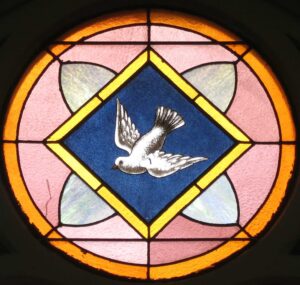I would first also address hopefully briefly why I don’t just rely on a spiritual inspiration as the confirmation of the trueness of Book of Mormon or any other church teaching, as most members do. As I stated earlier, we believe that the Holy Ghost will confirm the truth of it to us by a burning in the bosom or a feeling of comfort and peace. Here are some real descriptions of individuals describing these feelings:
“The first time the missionaries gave me a copy of the Book of Mormon, it was like a jolt of electricity went through my body. From that moment, I knew that the Book of Mormon was the word of God. However, it was through study, prayer, and a confirmation from the Holy Ghost that I knew for certain this was true.”
“But what can I say? How can I describe an experience so profound and so beautiful? Shall I say that it was the most blessed experience of my life? Shall I say that [God] touched my heart and gave me a feeling of peace I had not known before? Shall I describe the tears that flowed freely from my eyes, affirming my […] faith, as I […] beg[ged] [God’s] blessings for myself and for those I love?”
“As I read these books […], I felt a burning in my heart that I should come and investigate. My wife and I at that time had two children, and we made a decision that we should pray and fast for the four days that I would be gone […] I am reading now the writings […] regarding prophecy and private revelation. You find a beautiful bond between a proper caution regarding a reported message, and also openness to the Holy Spirit, and to prophecy and miraculous intervention.”
“Without understanding much […], he was attracted to temples. There he often felt a strong feeling of peace flowing through his body.”
“While on my journey, I was asking God what the truth was. I mean I was angry and I truly wanted to know. After a few weeks, I stumbled onto a website that talked about the very things I was curious about. It answered my questions in a way that I had not heard of before. I read everything on the web site and I even tried the experiment of asking God […]. After about 6 weeks, I felt a burning in my chest and a sensation that was unlike anything I had ever felt.”
Only the first one was an LDS member. The rest were a Muslim, a Catholic, a Hindu, and a New Age each speaking about their spiritual confirmation of their own religion. The peace or burning and conviction of the truth that each of these people felt was real. All of these members of different religions are all feeling spiritual promptings that they are in the right religion. How could they all be right, when all of these religions teach very different doctrines?
As I believe the LDS approach goes, all churches have some truth, so they will all feel the Spirit in some way. But is that really what’s going on here?
This is the situation of the religious world:
- There are thousands of religions, Christian and non-Christian, all with conflicting doctrines.
- Each one of them has many members in it who claim to know that their church is the right one.
- They “know” they are right based on spiritual promptings during prayer or meditation.
LDS members claim to have access to a special and unique experience that other people in other religions don’t experience. But that is just not true. The LDS church isn’t special in its use of spiritual promptings as “proof” of the truth. That’s the method everyone uses in every religion.
Let me give a poor but hopefully sufficient example. An old friend who had struggled with drugs invites you to his house to share to wonderful news that he has overcome the addiction with the help of his LDS bishop. Your friend explains after rereading the teachings and examples of Alma and Enos, in the Book of Mormon, he felt hope for the first time. He prayed and fasted, met regularly with his bishop, and he was given the strength he lacked on his own. As your friend speaks and then the bishop shares his testimony of repentance and forgiveness, you feel joy and a warmth all over. What do these feelings mean? Well, we would say it is confirmation of the truth of our friend’s testimony and of the Book of Mormon and church that helped him change
Now, what if instead of the LDS bishop, it was the Catholic priest? You friend read from the bible and found help at the Catholic church. The priest delivers a beautiful message at this gathering about change and mercy. You feel joy and a nice warm feeling as he speaks. What does this mean? If you ask the priest, what would he say? It isn’t hard to imagine the answer being something to the effect that he is a messenger of God delivering the truth, and you should join him at mass on Sunday.
Being LDS, you might rationalize that the Catholic priest has some truth and the change was good, and so the message reached you through the Holy Ghost, but it didn’t mean anything else other than that the message was good.
Now, what if instead of the LDS or Catholic church, your friend found help through the local Hindu temple, the local Hindu pujari was sharing the message, and you feel the same burning in your bosom. Does it mean that the Hindus have the truth? Or does it just mean that the message was an uplifting and inspiring message which touched you deeply?
Last example. I love the Lion King movie, as many people do. Every time I watch it, I have intense feelings when Simba speaks to his father in the stars. I felt that it was the Holy Ghost. Why did I feel that way? Did it mean that the Lion King movie actually happened? Did it mean that our ancestors are really the stars we see? Or just a wonderfully touching message?
I give these examples to show:
- There are very possible and real situations outside of church/prayer where you could feel these special feelings,
- and what we take those feelings to mean is personal — it depends greatly on our past experiences and our perspective in that moment.
What does it mean if we feel the burning in the bosom upon reading the Bible, or the Book of Mormon, or the Quran, or the Buddhist Kangyur, or the Sikh Guru Granth Sahib? I propose that it means that what we read is a beautiful, uplifting message. I love many of the teachings of the Book of Mormon and find it to be a wonderfully inspiring book. The issue is that the LDS church holds up the Book of Mormon as proof that Joseph Smith, Jr saw what he said he saw, received what he said he received, and did what he said he did.
As Joseph Smith, Jr and many other prophets and apostles have similarly said, “… the Book of Mormon [is] the most correct of any book on earth, and the keystone of our religion…” I hung my faith on this, just as we are taught to do — if the Book of Mormon is an actual historical book as it purports, then Joseph Smith, Jr was the chosen prophet of our dispensation to restore the true gospel of Christ and with it the legitimate church of Christ. If not, then under the best possible light, he was an inspiring leader who either purposely with good intentions or unintentionally convinced others to believe in beautiful but untrue doctrines. Unfortunately, that would also mean he was a fraud, as President Hinckley stated in the earlier quote. If that be the case, and the Book of Mormon is not the truly historical book as claimed, the keystone is gone and the LDS religion is should not continue to be held up by unfounded faith and hope alone.




